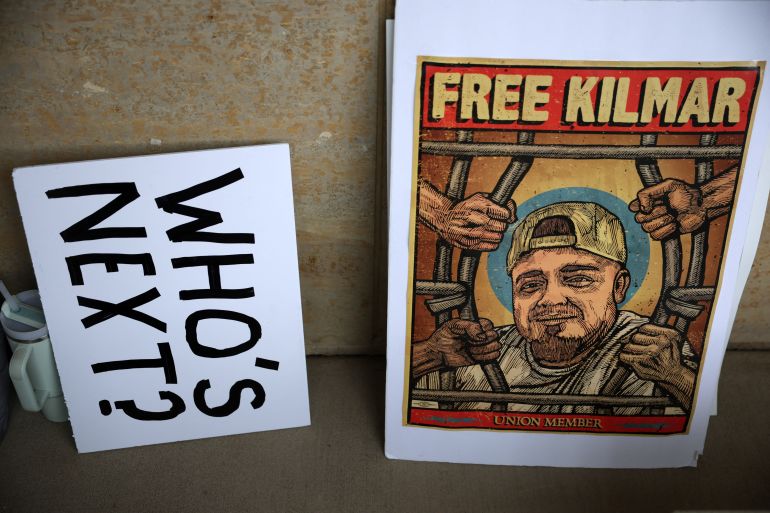US judge rejects Abrego Garcia’s asylum bid after wrongful deportation
The rejection of his asylum case is the latest turn in a case that has become emblematic of President Donald Trump’s mass deportation campaign.

By Joseph Stepansky and News Agencies
Published On 2 Oct 20252 Oct 2025
Save
A United States immigration judge has denied an asylum bid from Kilmar Abrego Garcia, whom the administration of President Donald Trump wrongfully deported to El Salvador earlier this year before returning him to the US.
The rejection, announced late on Wednesday, was hailed by the Trump administration, which has remained defiant after deporting Abrego Garcia in March despite a judge’s order.
Recommended Stories
list of 3 itemsend of list
Abrego Garcia’s case has become emblematic for critics of abuses under Trump’s mass deportation efforts.
In a post on the social media platform X, the Department of Homeland Security said “one thing is certain” after the ruling: “This Salvadoran man is not going to be able to remain in our country”.
However, Abrego Garcia will still have 30 days to appeal the decision issued by the Baltimore-based immigration judge. His lawyers did not immediately publicly comment on the latest order.
Abrego Garcia crossed into the US without documentation as a teenager and has lived in Maryland with his wife and children for several years.
He was arrested by immigration authorities in 2019, at which time a judge ruled that he was not eligible to apply for asylum. However, the judge ruled that Abrego Garcia could not be deported to his home country of El Salvador, citing the possibility of his being targeted by a gang there.
Nevertheless, despite the 2019 protection order, Abrego Garcia was among the hundreds of immigrants arrested and sent to El Salvador’s Terrorism Confinement Centre (CECOT) in March, as part of Trump’s mass deportation initiative.
Advertisement
Facing a Supreme Court order to “facilitate” his return, the Trump administration ultimately brought Abrego Garcia back to the US in June.
However, federal authorities immediately charged him with human smuggling, citing a 2022 traffic stop in Tennessee, and they took him into custody.
His lawyers have dismissed the charges as trumped up and baldly political.
In August, Abrego Garcia was briefly released but was detained days later by immigration officials. He is currently being held in a detention centre in Pennsylvania.
Immigration authorities have since sought to deport Abrego Garcia to a third-party country, in an effort to work around the judge’s 2019 decision barring his deportation to El Salvador. Uganda and Eswatini, both countries in Africa, have been floated as possible destinations.
Trump officials have repeatedly claimed Abrego Garcia is a member of the MS-13 gang, which the administration has labelled a “foreign terrorist organisation”. Trump officials have offered scant evidence to support the claim, which Abrego Garcia’s lawyers also reject.
They have called for the administration to be gagged, arguing the evidence-less claims could prejudice a jury.
Critics say the targeting of Abrego Garcia highlights the Trump administration’s hardline approach to deportations, which has increasingly swept up individuals with longstanding ties to the US and minimal, if any, criminal records.
Abrego Garcia, for example, has never been convicted of a crime.
Lawyers and human rights advocates have also accused the administration of circumventing the due process rights of those targeted in the immigration crackdown.
Trump has attempted to employ an 18th-century wartime law, the Alien Enemies Act, to quickly expel some individuals without legal review, but a federal appeals court in September found his use of the law illegal. The case is likely to reach the Supreme Court.
In a separate federal lawsuit filed in July, Abrego Garcia said he was psychologically and physically abused while held in El Salvador’s maximum-security CECOT prison, during the period the Trump administration refused to return him to the US.

